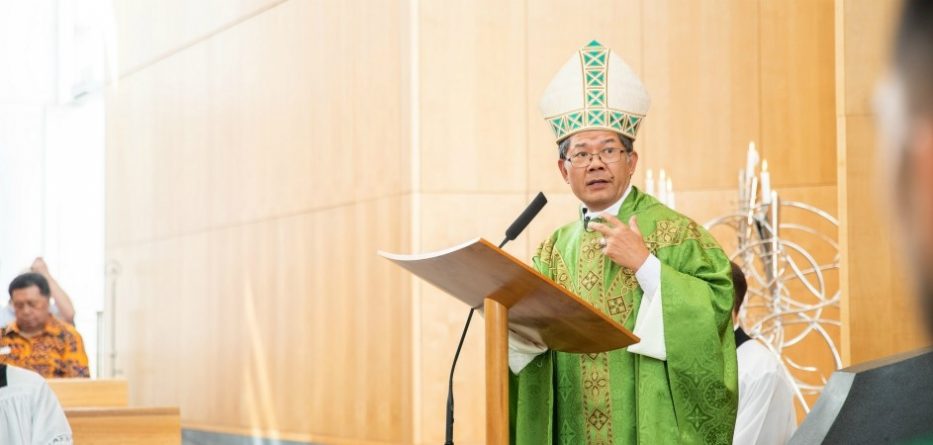Most Reverend Vincent Long Van Nguyen OFM Conv DD STL, Bishop of Parramatta
Homily for the 25th Sunday in Ordinary Time Year C 2019 at St Patrick’s Cathedral, Parramatta
Readings: Amos 8:4-7; 1Tim 2:1-8; Luke 16:10-13
22 September 2019
Putting God’s justice for the poor above personal gain
Dear friends,
In 1983, after he had recovered from his gunshot wounds, Pope John Paul II did something that showed the depth of his humanity. He went to prison and visited Mehmet Agca, his would-be assassin. They had a long private conversation and emerged as friends.
The Pope stayed in touch with Agca’s family during the latter’s incarceration, and in 2000 requested that he be pardoned. The request was granted. Mehmet later converted to Christianity while in prison and was finally released in 2010. In December 2014, he returned to Rome and laid two dozen white roses at the tomb of the Pope who had been canonised a few months earlier.
The readings this 25th Sunday in Ordinary Time also remind us of our duty to imitate the God of utter magnanimity, graciousness and forgiveness. In the first reading, the prophet Amos sternly cautions the people about the unjust practices that go against the heart of their religion: the lowering of the bushel, the raising of the shekel and the tampering with the scales et cetera are some of them.
By acting unjustly, the Israelites betray the very purpose of the Exodus, which was their liberation from slavery and oppression. They betray the very God who freed them and formed them into a new society of justice, solidarity and equality. Amos warns Israel that a society that is not aligned to God’s purposes is not sustainable.
The Northern Kingdom where Amos ministered was particularly susceptible to undue foreign influences, including religious and moral malpractices. Amos urges them to follow the dictates of God’s law. He calls them not to conform to imperial pressure but to become an alternative society under God’s rule, a community of hospitality, compassion, justice and neighbourliness.
The Gospel confirms this message, albeit in a way that may not be so obvious to us. Jesus tells the Parable of the Dishonest Servant who has failed his duty of stewardship. He faces the prospect of unemployment, reduced status and even ridicule. He has one more roll of the dice and he does it shrewdly. He calls the master’s debtors and writes down their debts.
In other words, he banks on his master’s generosity. By writing down the debts, he actually makes the claim that his master cannot fault him: that the master forgives those who owe him, that he is generous and magnanimous. For banking on this defining virtue of his master, the dishonest servant was praised.
The Word of God thus challenges us about our relationship with God and with one another. If God is so generous and forgiving to us, we too must be generous and forgiving with one another. We cannot be the disciples of Jesus and think and act merely in terms of the raw justice of the world. None of us could be saved if God applied the strict justice on the basis of our merits.
The parable is actually designed to prod at our sense of entitlement and merit. It challenges to think and act in the way that God in Jesus has shown us, which is not a raw justice of the world but the justice of the Kingdom and the very mercy of God.
Dear friends,
“You cannot be the slave of both of God and of money.” The Word of God today lays bare the radical demands of Christian discipleship. Jesus makes it clear that following him has to do with an alternative mode of existence where we prioritise the common good and reflect the divine goodness instead of self-interest.
We live in the world in which people amass wealth and place self-interest as the number one priority, even at the cost of the common good of humanity and planet earth. This week has seen a global demonstration, galvanised from the grass-roots level, against political indifference and inaction in regards to pressing environmental concerns.
The Gospel calls us to responsible stewardship of what we have been given in trust. We must safeguard and foster the diverse life forms that the Creator God has entrusted to us.
The early Christian community showed us the way. They negotiated between self-survival and stewardship, accumulation and distributive justice. They abandoned the default position of self-interest and embraced radical communion. They shared their possessions and made sure that no one was left behind. They formed an intentional community of sharing in common with each other and looking after the most vulnerable.
This is what faithful discipleship looks like. It is a journey that demands courage because it forces us to abandon security in favour of vulnerable trust, self-interest in favour of passion for justice and preferential option for God’s poor.
Let us pray that we may prioritise the common good and reflect the divine goodness instead of self-interest. May the teaching and example of Jesus guide us as we endeavour to build relationships and communities that mirror the Reign of God. May we reflect the largesse, magnanimity and compassion of God revealed in Christ.








